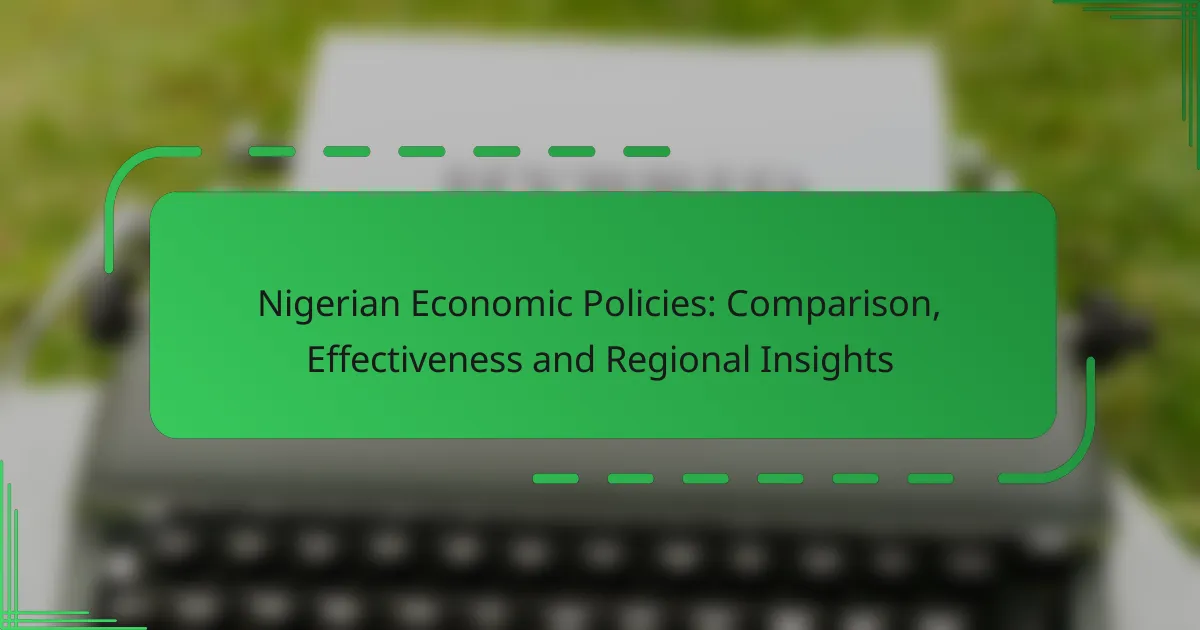Nigerian economic policies are designed to foster growth and stability through a variety of strategies, including fiscal reforms and trade initiatives. Their effectiveness varies across sectors, with some policies successfully promoting development while others face challenges such as inflation and unemployment. Additionally, regional differences influenced by local resources and demographics play a critical role in shaping the impact of these policies.

What are the key Nigerian economic policies?
Nigerian economic policies encompass a range of strategies aimed at promoting growth, stability, and development. These policies include fiscal reforms, monetary adjustments, trade initiatives, investment incentives, and sector-specific regulations that collectively shape the economic landscape.
Fiscal policy reforms
Fiscal policy reforms in Nigeria focus on improving government revenue and optimizing public spending. Key measures include tax reforms aimed at broadening the tax base and enhancing compliance, as well as efforts to reduce budget deficits through better expenditure management.
For instance, the introduction of the Finance Act has aimed to streamline tax administration and increase revenue collection. Stakeholders should monitor the impact of these reforms on public services and infrastructure investment.
Monetary policy adjustments
Nigeria’s monetary policy adjustments are primarily managed by the Central Bank of Nigeria (CBN) to control inflation and stabilize the currency. The CBN employs tools such as interest rate changes, reserve requirements, and open market operations to influence liquidity in the economy.
In recent years, the CBN has adjusted interest rates to combat inflation, which has fluctuated significantly. Businesses should stay informed about these changes, as they directly affect borrowing costs and investment decisions.
Trade policy initiatives
Nigeria’s trade policy initiatives aim to enhance export competitiveness and reduce reliance on imports. The government has implemented policies to promote local production and diversify the economy away from oil dependency.
Examples include the African Continental Free Trade Area (AfCFTA) agreement, which seeks to boost intra-African trade. Companies should explore opportunities within this framework to expand their market reach while being mindful of trade regulations.
Investment incentives
Investment incentives in Nigeria are designed to attract both local and foreign investors. These incentives may include tax holidays, customs duty exemptions, and access to special economic zones that offer favorable operating conditions.
For example, the Nigerian Investment Promotion Commission (NIPC) provides various incentives for sectors like agriculture and technology. Investors should assess these opportunities to maximize returns while understanding the compliance requirements involved.
Sector-specific policies
Nigeria’s sector-specific policies target key industries such as agriculture, manufacturing, and technology to stimulate growth and innovation. These policies often include funding programs, regulatory support, and infrastructure development tailored to each sector’s needs.
For instance, the Agricultural Promotion Policy aims to boost food security and increase agricultural productivity. Stakeholders in these sectors should align their strategies with government priorities to leverage available support and funding opportunities.

How effective are Nigerian economic policies?
Nigerian economic policies have shown mixed effectiveness, impacting various sectors differently. While some initiatives have spurred growth, others have struggled to control inflation and boost employment.
Impact on GDP growth
Nigerian economic policies have aimed to stimulate GDP growth through diversification and investment in key sectors like agriculture and technology. Recent years have seen GDP growth rates fluctuate, often ranging between 2% to 4%, influenced by global oil prices and domestic challenges.
For instance, the government’s focus on local production and import substitution has led to some positive growth in non-oil sectors. However, the reliance on oil revenue remains a significant risk to sustained economic expansion.
Inflation control outcomes
Inflation control in Nigeria has been a significant challenge, with rates often exceeding single digits. Policies aimed at stabilizing the naira and controlling food prices have had limited success, leading to inflation rates that can reach the high teens.
Efforts such as monetary tightening by the Central Bank of Nigeria have been implemented, but external factors like global commodity prices and local supply chain issues continue to exert upward pressure on inflation.
Employment rate changes
Nigerian economic policies have struggled to significantly reduce unemployment, which remains a pressing issue. The unemployment rate has hovered around 30%, with youth unemployment being particularly high.
While initiatives to promote entrepreneurship and vocational training exist, the scale of job creation has not kept pace with the growing labor force. Addressing this requires more robust policies that directly target job creation in various sectors.
Foreign investment levels
Foreign investment levels in Nigeria have been inconsistent, influenced by regulatory environments and economic stability. Despite efforts to improve the investment climate, foreign direct investment (FDI) has often been below potential, typically in the low billions of USD annually.
Recent reforms aimed at easing business operations and attracting investors have shown promise, but concerns over security and infrastructure still deter significant foreign capital inflow. Building investor confidence remains crucial for enhancing these levels.

What are the regional insights on Nigerian economic policies?
Nigerian economic policies exhibit significant regional variations, influenced by local resources, demographics, and historical contexts. Understanding these insights is crucial for evaluating the effectiveness of these policies across different regions.
Effects in Northern Nigeria
The economic policies in Northern Nigeria often focus on agriculture and livestock, reflecting the region’s reliance on these sectors. Initiatives aimed at improving irrigation and access to markets have had mixed results, with some areas seeing increased productivity while others struggle with infrastructure challenges.
Additionally, the implementation of social investment programs has aimed to reduce poverty levels, but the effectiveness varies significantly due to security issues and limited access to education. Overall, while there are positive developments, many communities still face substantial economic hurdles.
Impacts in Southern Nigeria
In Southern Nigeria, economic policies tend to emphasize industrialization and trade, leveraging the region’s proximity to international markets. The focus on developing ports and enhancing logistics has led to a more vibrant business environment, particularly in cities like Lagos and Port Harcourt.
However, the region also grapples with challenges such as regulatory bottlenecks and environmental concerns related to oil extraction. Balancing economic growth with sustainable practices remains a critical issue for policymakers.
Western Nigeria economic trends
Western Nigeria is characterized by a diverse economy, with agriculture, manufacturing, and services all playing vital roles. Recent policies have aimed to boost local manufacturing through incentives and support for small and medium enterprises (SMEs).
Despite these efforts, the region faces competition from imports and a need for improved infrastructure. Economic trends indicate a growing emphasis on technology and innovation, which could drive future growth if supported by adequate investment and training.
Eastern Nigeria policy responses
Eastern Nigeria has responded to economic policies with a focus on revitalizing its agricultural sector and promoting entrepreneurship. The region has seen initiatives aimed at enhancing food security and reducing reliance on imports.
However, challenges such as inadequate funding and limited access to markets hinder progress. Policymakers are encouraged to foster partnerships with private sectors to enhance capacity and drive economic development effectively.

How do Nigerian economic policies compare to other West African countries?
Nigerian economic policies exhibit distinct characteristics when compared to those of other West African nations, particularly in areas like trade, investment, and regulatory frameworks. While Nigeria focuses on diversifying its economy and reducing reliance on oil, other countries like Ghana and Senegal have adopted different strategies that reflect their unique economic contexts.
Comparison with Ghana’s policies
Ghana’s economic policies emphasize fiscal discipline and investment in infrastructure, which have led to steady growth in sectors like agriculture and services. Unlike Nigeria, which has faced challenges in managing inflation and currency stability, Ghana has maintained a more stable macroeconomic environment, often attracting foreign direct investment (FDI) due to its favorable business climate.
One notable difference is Ghana’s approach to public debt management. Ghana has implemented strict guidelines to limit public spending, while Nigeria has struggled with high debt levels. This fiscal prudence in Ghana has allowed for more sustainable economic growth, although challenges remain in ensuring equitable distribution of wealth.
Comparison with Senegal’s policies
Senegal’s economic policies are characterized by a strong emphasis on agricultural development and social programs aimed at poverty reduction. The government has invested heavily in infrastructure projects, similar to Nigeria, but has been more successful in attracting international partnerships and funding, which has bolstered its economic resilience.
Additionally, Senegal’s focus on renewable energy initiatives contrasts with Nigeria’s heavy reliance on fossil fuels. This strategic pivot not only enhances energy security but also positions Senegal as a leader in sustainable development within the region.
Comparison with Côte d’Ivoire’s policies
Côte d’Ivoire has pursued aggressive economic reforms aimed at boosting agricultural exports and improving the business environment. The country has successfully implemented policies that have led to significant growth in the cocoa and cashew sectors, making it one of the largest producers globally.
In contrast, Nigeria’s economic policies have often been hindered by regulatory challenges and corruption, which can deter investment. Côte d’Ivoire’s streamlined regulatory framework and focus on export diversification have allowed it to achieve higher growth rates compared to Nigeria in recent years.

What frameworks can assess the effectiveness of these policies?
To assess the effectiveness of Nigerian economic policies, various frameworks can be employed, including economic indicators and stakeholder impact analysis. These frameworks provide insights into how policies influence economic performance and the well-being of different groups within society.
Economic indicators framework
The economic indicators framework evaluates policies based on measurable data such as GDP growth, inflation rates, and employment figures. By analyzing these indicators, policymakers can determine the direct economic impacts of their initiatives.
For instance, a significant increase in GDP following a policy implementation may suggest its effectiveness, while rising inflation could indicate adverse effects. Regular monitoring of these indicators helps in making timely adjustments to policies as needed.
Stakeholder impact analysis
Stakeholder impact analysis focuses on how economic policies affect various groups, including businesses, consumers, and marginalized communities. This framework assesses both positive and negative outcomes, providing a comprehensive view of policy effectiveness.
For example, a policy aimed at boosting small businesses may be successful if it leads to increased revenue and job creation within that sector. However, if it inadvertently raises costs for consumers, the overall effectiveness may be questioned. Engaging stakeholders in the evaluation process can enhance the understanding of these impacts.

What are the challenges facing Nigerian economic policies?
Nigerian economic policies face significant challenges, including corruption, inadequate infrastructure, and fluctuating oil prices. These issues hinder sustainable growth and limit the effectiveness of policy implementation.
Corruption and Governance Issues
Corruption remains a major barrier to effective economic policy in Nigeria. It undermines public trust and diverts resources away from essential services and development projects. Strengthening governance frameworks and increasing transparency are crucial steps to combat corruption.
Inadequate Infrastructure
The lack of reliable infrastructure, such as roads, electricity, and water supply, severely impacts economic activities. Poor infrastructure increases operational costs for businesses and limits access to markets. Investment in infrastructure development is essential for improving economic performance.
Dependence on Oil Revenue
Nigeria’s heavy reliance on oil revenue makes its economy vulnerable to global price fluctuations. When oil prices drop, government revenues decline, leading to budget deficits and reduced public spending. Diversifying the economy by promoting sectors like agriculture and technology can mitigate this risk.
High Unemployment Rates
High unemployment rates, particularly among youth, pose a significant challenge to economic stability. The lack of job opportunities can lead to social unrest and hinder economic growth. Policies aimed at job creation, vocational training, and entrepreneurship support are vital to address this issue.
Inflation and Currency Fluctuations
Inflation and currency fluctuations create uncertainty in the Nigerian economy, affecting purchasing power and investment decisions. Maintaining stable monetary policies and controlling inflation rates are necessary to foster a conducive economic environment.



